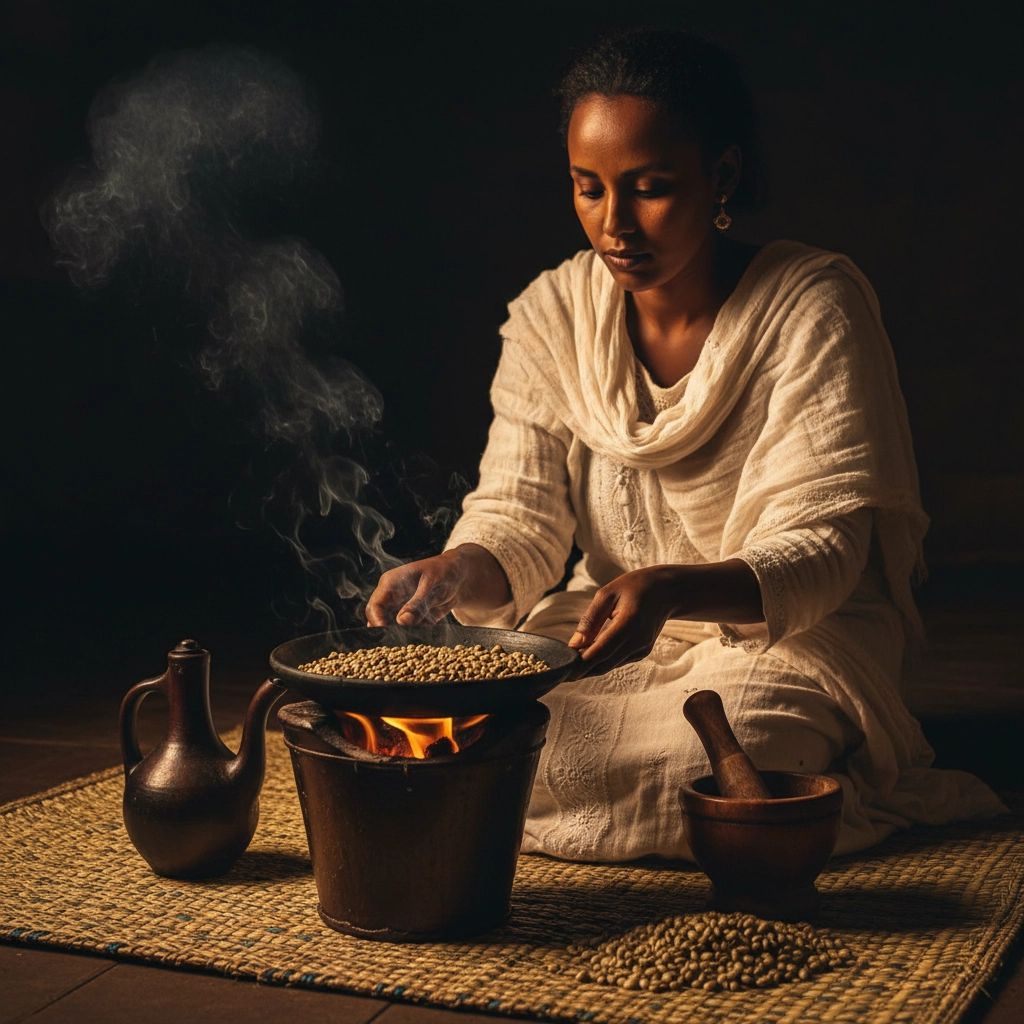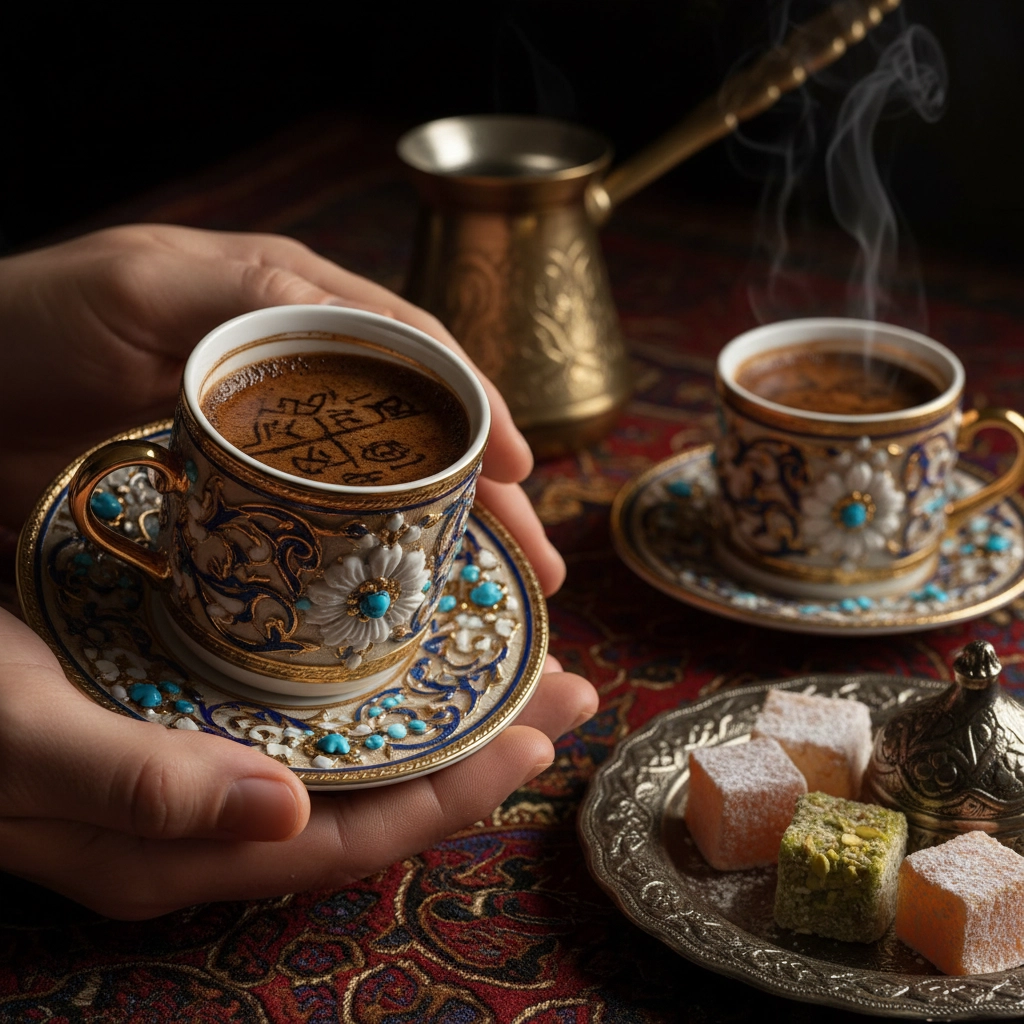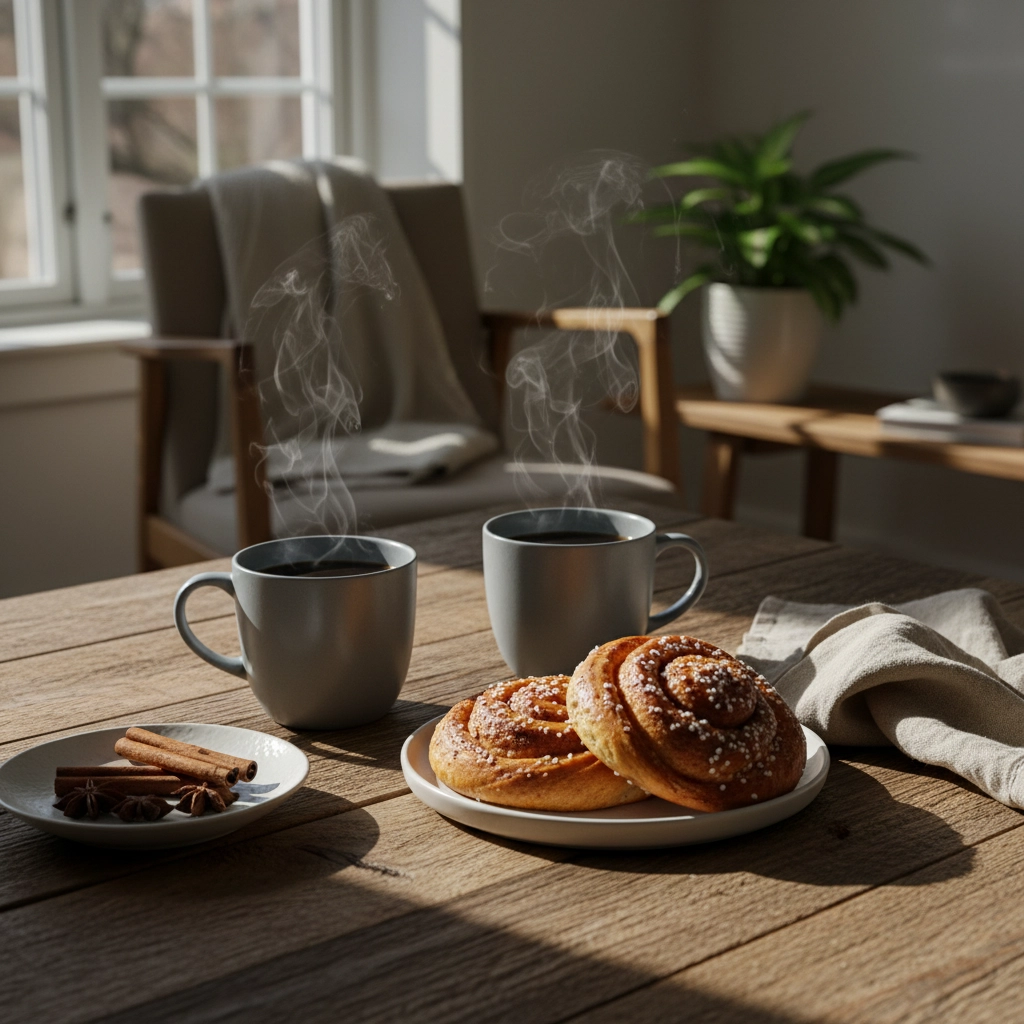Coffee isn't just a drink, it's a universal language that speaks to cultures across the globe. From the bustling espresso bars of Rome to the sacred ceremonies of Ethiopia, each sip tells a story of tradition, community, and connection. Let's take a journey around the world to explore how different cultures have transformed this simple bean into something truly magical.
Ethiopia: Where It All Began
Ethiopia holds a special place in coffee history as the birthplace of coffee itself. Here, coffee isn't just consumed, it's celebrated through one of the world's most elaborate and meaningful rituals: the Ethiopian coffee ceremony.

Picture this: fresh green coffee beans are carefully roasted over an open flame, filling the air with an intoxicating aroma that draws everyone together. The beans are then ground by hand using a mortar and pestle, before being brewed in a traditional clay pot called a jebena. This isn't a quick process, the ceremony can take hours and involves three distinct rounds: abol, tona, and baraka.
Each round carries deeper meaning, representing blessings and strengthening community bonds. The first cup is for blessing, the second for wisdom, and the third for spiritual fulfillment. It's a beautiful reminder that coffee can be so much more than a caffeine fix, it can be a pathway to connection and mindfulness.
Italy: The Art of Espresso Living
When you think of coffee culture, Italy probably comes to mind immediately. And for good reason, Italians have perfected the art of espresso living in ways that feel almost magical to outsiders.

In Italy, coffee is a social institution. Picture the typical Italian morning: locals stand at marble-topped café counters, sipping their espresso shots in just a few quick gulps while chatting with baristas who know their order by heart. There's something beautifully efficient about it, no lingering over laptops or treating coffee shops as second offices. It's about connection, conversation, and getting on with your day.
The rules of Italian coffee culture are unwritten but strict. Cappuccino? Only before 11 AM, please. Ordering a cappuccino after dinner might earn you some confused looks from locals. And forget about those giant to-go cups: Italian coffee is meant to be savored quickly and in company.
Turkey: Fortune in Every Cup
Turkish coffee culture dates back to the Ottoman Empire and carries with it centuries of tradition and mystique. The preparation alone is an art form that requires patience and skill.
Using a special pot called a cezve, finely ground coffee is slowly simmered with water and sugar over low heat. The result? A thick, rich brew that's served in small cups alongside Turkish delights or other sweet treats.

But here's where it gets really interesting: Turkish coffee culture includes the ancient practice of tasseography: reading fortunes in the coffee grounds left at the bottom of your cup. After finishing your coffee, you'll swirl the remaining grounds, turn the cup upside down on the saucer, and let a friend interpret the patterns. It's like having a crystal ball in your coffee cup, turning every coffee break into a mystical experience.
Scandinavia: The Fika Philosophy
If Italians have mastered the quick coffee culture, Scandinavians have perfected the opposite: slow, social coffee experiences that prioritize connection and well-being.
In Sweden, there's a beautiful concept called fika: a dedicated time to pause, enjoy coffee, and connect with others. It's not just a coffee break; it's a philosophy of life that recognizes the importance of slowing down. During fika, you'll enjoy coffee alongside pastries like cinnamon buns or cardamom cookies, and the focus is entirely on being present with the people around you.
Norway has a similar tradition called kaffeslabberas: long, leisurely coffee gatherings with friends or family that can stretch for hours. These aren't rushed affairs but intentional moments of connection that strengthen relationships and build community.
Japan: Precision and Perfection
Japanese coffee culture represents a fascinating blend of traditional tea ceremony principles applied to coffee preparation. The Japanese approach to coffee is characterized by meticulous attention to detail and the pursuit of perfection.

In Japan, you'll find coffee shops where baristas treat each cup like a work of art. The pour-over method is elevated to an almost meditative practice, with precise measurements, exact temperatures, and carefully controlled pouring techniques. Siphon coffee makers are common, creating a theatrical brewing experience that's as much about the show as it is about the taste.
The Japanese concept of omotenashi: wholehearted service: extends to coffee culture, where every detail is considered for the customer's experience. From the perfectly calibrated grind to the precise serving temperature, Japanese coffee culture embodies the pursuit of perfection.
The Middle East: Coffee as Hospitality
Throughout the Middle East, coffee serves as a cornerstone of hospitality and social interaction. Arabic coffee, known as qahwa, is typically flavored with cardamom and served from beautiful brass or silver pots called dallah.

The preparation and serving of Arabic coffee follows specific protocols that have been passed down through generations. The eldest person is served first, and it's considered polite to accept at least one cup when offered. Refusing coffee can be seen as rejecting the host's hospitality.
In many Middle Eastern cultures, the coffee ceremony is an opportunity for important conversations, business discussions, and strengthening social bonds. The aromatic blend of coffee and cardamom creates an atmosphere of warmth and welcome that embodies the region's emphasis on hospitality.
What We Can Learn
These diverse coffee cultures teach us something beautiful: there's no single "right" way to enjoy coffee. Whether you prefer the quick efficiency of Italian espresso culture, the ceremonial mindfulness of Ethiopian traditions, the social connection of Scandinavian fika, or the artistic precision of Japanese preparation methods, each approach offers its own unique benefits.
At Gently Ground Coffee, we celebrate this diversity by offering beans and blends that honor these global traditions. Because whether you're rushing out the door with a quick espresso or settling in for a long, contemplative coffee ceremony, every cup deserves to be exceptional.
The next time you brew your morning coffee, take a moment to consider the rich tapestry of traditions that have shaped this simple yet profound ritual. After all, you're participating in a global conversation that spans continents and connects cultures: one delicious sip at a time.




